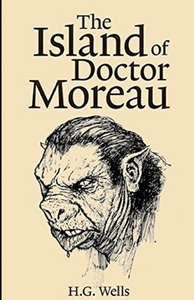Take a photo of a barcode or cover
While writing a novel of my own, I thought it be wise to read a book some what related to my own. I was reffered to this book by a family member, promising a good read, and I was not disapointed.
H.G. Wells is one of my favorite authors, and he has done it again with this perfect example of science and man. He reaches in to the ID and explores the human mind so vividly, I am pleased to say that this book has a reserved spot on my book-shelf.
H.G. Wells is one of my favorite authors, and he has done it again with this perfect example of science and man. He reaches in to the ID and explores the human mind so vividly, I am pleased to say that this book has a reserved spot on my book-shelf.
If you can put aside the extremely problematic aspects of this book (it's a 'product of its time' as the kids say), it's quite an interesting read. I don't think I've ever read another classic that takes a stance on animal rights and addresses current (at the time of publishing) animal rights topics. There are some moments where I thought, "Okay Michael Crichton, I see where you got the idea for Jurassic Park." I'm definitely not the first person to see the parallel there, and I won't be the last. There was also a lot of social commentary about humans and our beastly nature. Like I said, it was interesting.
Honestly only finished this because it's so short; it was fast paced yet felt like it took a lifetime to read. I already had some knowledge of what happened due to Wells being such a staple in the sci-fi genre, but I found it to be pretty boring. The use of racist/ableist descriptors being used for Moreau's creations was not unexpected, given the year it was originally published, but it certainly didn't make it any less of a drag to read. I understand the message the author was going for, but it felt a bit too forced to me in this day and age despite it probably eliciting a different reaction upon release.
Something buried deep in my unconscious memory came alive and I barked, "Not to go on all fours, that is the law!" at my toddler, which reminded me it had been a long time since I read this sci-fi classic.
Revisited in 2020 and was impressed with how exciting and thought-provoking this is still today. Forgive it a slow beginning and a weak conclusion - this comes alive in a big way in the height of Act Two. 4 stars!
Revisited in 2020 and was impressed with how exciting and thought-provoking this is still today. Forgive it a slow beginning and a weak conclusion - this comes alive in a big way in the height of Act Two. 4 stars!
This is one of the creepier books that I've read, but I like it for that reason. It gives me the shivers in a good way. I had some difficulty getting into it because I didn't feel connected with any of the characters, but once I accepted more of an observer's role the reading went smoothly. I'm glad that things eventually worked out for Prendick even though he was very much changed by his experiences.
2.5 stars
As a person suffering from a going-on-two-months reading slump, forcing myself through a classic science fiction novella might not have been a great idea but school does not account for that :).
Anyways, this work is my first experience with H.G. Wells and I must admit I am very glad to have read this piece of classic sci-fi literature, from one of the guys who put the genre on the map. Not only is the premise interesting (and it has influenced a bunch of subsequent works), but I find the historical context surrounding it pretty interesting too.
We follow Edward Prendick as he finds himself on the island of Dr. Moreau, a scientist exiled from England due to his unethical dabbling into vivisections. However, the islanders seem peculiar: they exhibit strange behaviours and animalistic features. Moreau himself seems to be hiding something behind the doors to his laboratory where the cries of a puma slowly drive Prendick insane. I thought the book was cool (I vibed especially with the spooky stuff), but ultimately I am in a reading slump and this is late 19th century literature.
The story is very straightforward at first glance, but as with most classic sci-fi, there is a lot of unpacking to do regarding the social atmosphere of the time, the science around the time, and the author's biases. Personally, I don't really connect with classic sci-fi too much because although I do like the exploration of these fantastic ideas, I need characters and intrigue to be a rock for me that I can cling to, and once again didn't have that.
When all is said and all is done, the cover still slaps.
As a person suffering from a going-on-two-months reading slump, forcing myself through a classic science fiction novella might not have been a great idea but school does not account for that :).
Anyways, this work is my first experience with H.G. Wells and I must admit I am very glad to have read this piece of classic sci-fi literature, from one of the guys who put the genre on the map. Not only is the premise interesting (and it has influenced a bunch of subsequent works), but I find the historical context surrounding it pretty interesting too.
We follow Edward Prendick as he finds himself on the island of Dr. Moreau, a scientist exiled from England due to his unethical dabbling into vivisections. However, the islanders seem peculiar: they exhibit strange behaviours and animalistic features. Moreau himself seems to be hiding something behind the doors to his laboratory where the cries of a puma slowly drive Prendick insane. I thought the book was cool (I vibed especially with the spooky stuff), but ultimately I am in a reading slump and this is late 19th century literature.
The story is very straightforward at first glance, but as with most classic sci-fi, there is a lot of unpacking to do regarding the social atmosphere of the time, the science around the time, and the author's biases. Personally, I don't really connect with classic sci-fi too much because although I do like the exploration of these fantastic ideas, I need characters and intrigue to be a rock for me that I can cling to, and once again didn't have that.
When all is said and all is done, the cover still slaps.
reflective
tense
fast-paced
Plot or Character Driven:
A mix
Strong character development:
Yes
Loveable characters:
No
Diverse cast of characters:
No
Flaws of characters a main focus:
Complicated
adventurous
dark
mysterious
reflective
tense
fast-paced
Plot or Character Driven:
A mix
Strong character development:
Complicated
Loveable characters:
Complicated
I don’t like any of the characters. Moreau isn’t supposed to be likable, since he’s unethical. But, Montgomery is a misanthrope who can’t seem to think for himself, and the narrator seems full of himself. The ideas about humanity are interesting, but all of the characters are awful.
Wyspa to w literaturze najczęściej symbol izolacji; oddzielnej społeczności, która kreuje własne zasady i prawa, posiada odrębne obyczaje i niekiedy ma całkowicie odmienne poczucie moralności od "cywilizacji". Tak jest również w przypadku dzieła H. G. Wellsa. Jeśli jednak wpisuje się to w ten schemat, to mimo niemal 140 lat na karku potrafi zszokować, zdziwić, zmusić do przemyśleń?
Zdecydowanie tak! Tylko nie diametralnie. Odniosłem wrażenie, że filozofia rozkwita tam, gdzie kończy się już niestety książka Wellsa. Czuję się, jakby autor opisywał historie, które w opowiadaniach H. P. L. Należą do tych egzotycznych przygód bohaterów, które odmieniły ich światopogląd na odmienny i skrajny, będący przyczyną przyszłych strasznych wypadków.
No i cóż. Uwielbiam klasykę.
Zdecydowanie tak! Tylko nie diametralnie. Odniosłem wrażenie, że filozofia rozkwita tam, gdzie kończy się już niestety książka Wellsa. Czuję się, jakby autor opisywał historie, które w opowiadaniach H. P. L. Należą do tych egzotycznych przygód bohaterów, które odmieniły ich światopogląd na odmienny i skrajny, będący przyczyną przyszłych strasznych wypadków.
No i cóż. Uwielbiam klasykę.





